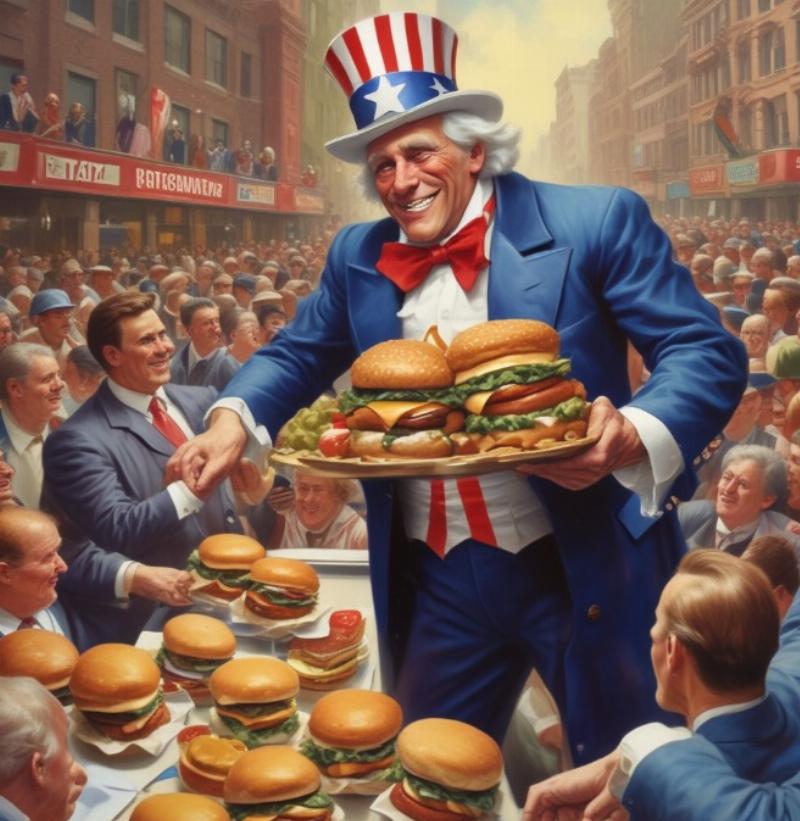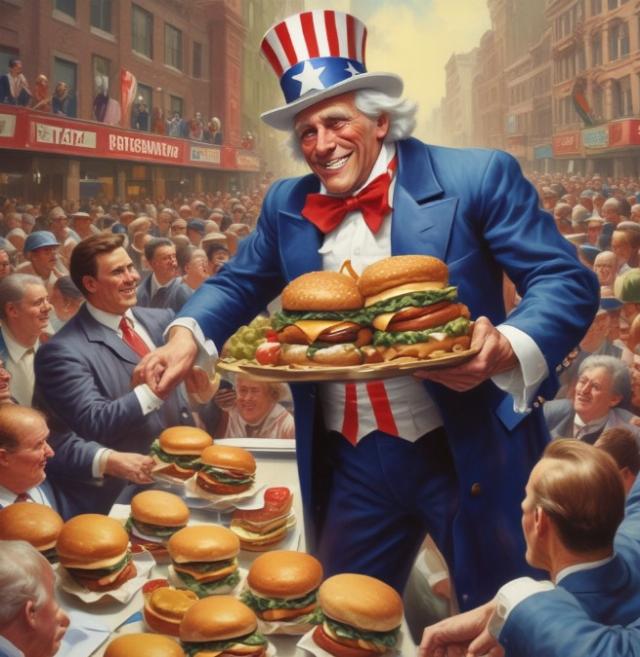


It has not been easy to rein in federal government spending. Lurid tales of federal government collapse fall on deaf ears. Ditto for pleas that “while it might be a good idea, we just cannot afford it.” As with drug addicts, appetites overwhelm reason.
This aversion to restraint is particularly notable in the liberal reaction to President Trump’s “Big Beautiful Bill” that cut tens of billions in “safety net” programs. Critics portrayed the bill as a death sentence for America’s poor and desperate people overseas. For these free-spenders, surely Uncle Sam can come to the rescue, print more money and save the world.
Fortunately, a compelling argument against overspending exists, albeit one seldom heard in today’s debate: moral hazard According to one definition: ‘a moral hazard is a situation where an economic actor has an incentive to increase its exposure to risk because it does not bear the full costs associated with that risk, should things go wrong.” Moral hazards encourage excessive risk-taking.
Consider the “Trump will Kill People” panic surrounding the bill’s reducing funding for the Supplemental Food Assistance Program (SNAP) or, colloquially, Food Stamps. SNAP is designed to help poor people supplement their diets, and while administered by individual states, it is largely Washington financed. Purchases were initially limited, but it now permits recipients to buy nearly everything except alcohol and tobacco products, pet food, prepared meals, cleaning supplies, cosmetics, paper products, and food containing marijuana. SNAP guidelines do not exclude soft drinks, snacks and “junk food.” There are currently 42 million SNAP participants, with 62% of them families with children.
The financial impact of Trump’s SNAP bill will reduce SNAP benefits. Key bill restrictions include work requirements which would cut out two million participants while reducing benefits for another five million. New Yorkers, for example alone will lose $1.1billion in SNAP benefits.
On the other side of the ledger, however, reducing “free food,” particularly unhealthy junk food will likely decrease obesity, and thus obesity-related disease such as Type 2 diabetes. As can readily be seen, U.S. obesity rates have tripled over the last 60 years, and 70% of all Americans are now either overweight or obese with the “morbidly obese” expanding tenfold. Oddly, given the historical pattern of rich people being fatter than the poor, in today’s world poor people are more likely to be obese. Particularly alarming is that obesity rates among children have gone from 5% in the 1970s to 19% by 2020.
The trend is hugely consequential. According to the National Cancer Institute, obese people are more likely to be at risk for pancreatic, liver, and thyroid cancer. CDC data also show elevate risks for heart disease, stroke, gallbladder disease, breathing problems, mental illness such as depression, and critically, type II diabetes. In 2013, Type II diabetes was declared an epidemic and is soaring among youngsters. During COVID the obese had triple the hospital admission as the non-obese.
The cost of this “free food” is multiplied when the sick avail themselves of publicly subsidized Medicare, Obamacare, Medicaid, or just don’t pay. Moreover, this public burden occurs even if the patient is not cured, since the treatment bill is sent to Uncle Sam regardless of outcome.
 Allowing millions of Americans to injure themselves thanks to “free” government food is only one example of a moral hazard. Another example comes from when President Trump briefly cancelled millions in “lifesaving” foreign aid to Africa. Facing intense opposition, the President reversed course but during the brief hiatus in U.S. medical funding, millions of Africans suffering from HIV/AIDS would not receive their medication and thus die.
Allowing millions of Americans to injure themselves thanks to “free” government food is only one example of a moral hazard. Another example comes from when President Trump briefly cancelled millions in “lifesaving” foreign aid to Africa. Facing intense opposition, the President reversed course but during the brief hiatus in U.S. medical funding, millions of Africans suffering from HIV/AIDS would not receive their medication and thus die.
Nevertheless, President Trumps’s cut in medical assistance was not as cruel as it might appear. First, the drugs do not cure HIV/AIDS; they only prevent death without restoring perfect health, and thanks to viral mutations, survivors are now infected with a stronger strain of AIDS. Then, given a second chance, those saved by U.S.-supplied medicine infected others, and the epidemic spreads thanks to U.S. intervention. According to UNESCO data, there were 25.6 million Africans infected with AIDS, a statistic far greater than elsewhere on the planet. This promiscuity among the AIDS-infected is especially harmful to young women and girls, since infected men favor this group. The upshot is that the rate for young females of new HIV/AIDS is 27% world-wide; in sub-Sahara Africa, it is 62%
Conceivably, a more humane policy would be mandatory incarceration for recipients of free U.S. supplied medicine. The infected would live but be unable to spread the disease and thus, ultimately, be unable to further spread the disease. U.S. foreign “compassionate” assistance to Africa to combat AIDS/HIV has thus become a perpetual motion death machine -- more funding, more disease and death, more disease and death, more funding…
In short, American taxpayers unwittingly subsidize dangerous behavior by ignoring the moral hazard of “doing good.” The SNAP recipient is seduced by “free” junk food all the while knowing that the resultant illness can be treated at public expense. The African men infected with HIV/AIDS should also thank Uncle Sam for providing a few extra years of sex and thus an opportunity to infect dozens of others, many of whom will die. Americans are, indeed, a generous people.
Moral hazards are easy to understand on a personal level but, when it comes to encouraging “the government” to give “free” money to an erstwhile “good cause,” virtue signaling easily trumps a cost/benefit analysis. Expanding SNAP offers a vision of helping starving people; it does not conjure up imagines of poor people having their toes and fingers amputated due decades of gorging on high-sugar junk food.
While monetary costs exist -- for fiscal year 2024 the federal government spend $100.4 billion on SNAP -- they are not itemized on tax returns. Similarly, in 2017 the nation’s bill for Type II diabetes was $327 billion and is skyrocketing, and it is only one of many obesity-related illnesses. “Feeding hungry children” can be an intoxicating virtue and one, seemingly, without limits.
Trump’s budget cutters should publicize moral hazards as the rejoinder to “budget cuts will kill millions.” It’s an easy argument, too. Why subsidize policies that are known to cause serious illness? At a minimum, SNAP can ban unhealthy food. Yes, millions of African children can be rescued from an early death, but what happens then they become starving adults and are easily recruited as soldiers to wage genocidal wars (330,000 killed in the past three years)? Unfortunately, obsessing over “doing good” rivals our obsession with eating free junk food. Both can be dangerous.
Image: AT via Magic Studio
